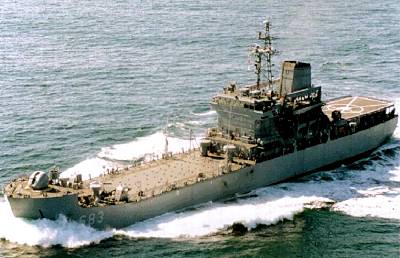WASHINGTON, June 11, 2010 — Kim Ruocco hung up the phone with her husband, relieved he had finally agreed to seek help for his increasingly severe bouts of depression.
Still, she had a nagging feeling that something wasn’t right. She decided to catch a red eye flight from Massachusetts to California, where her husband’s reserve unit was located, so she could be with him when he sought help.
After Ruocco landed, she called the hospital. He wasn’t there. She called his office. He hadn’t shown up. A sinking feeling set in. Ruocco rented a car and raced over to the hotel where her husband had been staying. When she arrived, several Marines were walking out of his hotel room.
The Marines were crying.
“I didn’t have to ask — I knew,” she said. Her 40-year-old husband, Marine Corps Maj. John Ruocco, an accomplished AH‑1 Cobra helicopter pilot and father of two, had hung himself just hours after his conversation with his wife.
Ruocco struggled to make sense of the loss that shook her family to its core. Yearning to give her husband’s death some meaning, she eventually immersed herself in efforts to combat suicide within the military.
Ruocco is now the director of suicide education and support for the Tragedy Assistance Program for Survivors, a nonprofit organization dedicated to helping families with a fallen military loved one. She has shared her story with thousands of troops across the nation, working to fight the stigma that kept her husband from seeking help.
“I wish I would have called the [military police] and told them there was someone in crisis,” she said of that night five years ago. “I wish I would have taken the chance in having him feel like I betrayed him — but at least he’d be alive.”
Her husband had battled bouts of depression for most of his adult life, Ruocco explained. Past incidents — including a fatal car accident in high school and aircraft crashes that took the lives of his friends – had stuck with him throughout the years. But he kept his feelings private, worried about disrupting his skyrocketing Marine Corps career.
After more than a decade in the Marines, Ruocco was at the pinnacle of his career field, his wife explained. An expert pilot, he had accepted an Air Force exchange position at Vance Air Force Base, Okla., where he trained new pilots on the T‑37 jet.
Ruocco took his work “very seriously,” she noted, and the demands of a fast-paced, post‑9/11 military were wearing him down.
“It was taking a toll; the stress and pressure,” she said. “He felt indebted to the Marine Corps and the Air Force, and indebted to us. He was trying to please everyone.”
Backed by his family, Ruocco decided to separate from the Marines. His wife and their then-8- and 10-year-old sons were pleased, since they had grown tired of the frequent moves and school changes.
“People thought, at almost 15 years, it was a crazy time to get out,” she said. “I felt it was better for the family.”
The major separated from active duty in 2004 and joined a reserve unit in Pennsylvania. While moving his family to their new home in Boston, he began training to be a pilot with Southwest Airlines in Texas.
Two weeks after he joined the reserve unit, Ruocco was activated and deployed to Iraq. His deployment went well, his wife said. He flew 75 missions, was awarded an Air Medal, given for meritorious achievement while participating in aerial flight, and led his troops with pride, she noted.
But post-deployment, life took a downturn. The job with Southwest didn’t pan out, and his Pennsylvania-based squadron had moved to California.
“The adrenaline with war was coming to a screeching halt,” Kim Ruocco said. “He was having difficulty flying because of the anxiety and depression. It was the snowball effect you see so often with suicide.
“People often think suicide is one thing, such as a relationship breakup,” she explained. “But that’s the final straw of a multitude of things that build up and tear away at a [servicemember].”
John was living in a hotel room in California, she said, where his depression was worsening by the day. He was due to deploy to Iraq again in the spring, but doubted his ability to lead there and also was afraid of letting his unit down, she said.
John Ruocco died on Super Bowl Sunday 2005. His beloved New England Patriots edged out the Philadelphia Eagles for the coveted football victory. But he didn’t watch the game. On their phone call that evening, Kim asked her husband if he was feeling so bad that he could kill himself. He told her he could never do that to her and the boys.
“He told me he was going to go on base and get help,” she said. “But also said that would be the end of everything; that it would ruin his career.
“Nothing is more important to a military man or woman than how people view you,” she added. The stigma of seeking help and the fear of being viewed differently prevented her husband from seeking the help he needed, Ruocco said.
“I believe he really meant it when he said he couldn’t do that to me and the kids, but he probably sat there and thought about the consequences of getting help, the concept of death before dishonor, and that he was mentally incapable of doing his duty,” she said. “That’s the final straw for [servicemembers], when they don’t feel they have anything to give anymore.”
Ruocco said she’s seen the same stories replayed on military installations throughout the world and hopes, by sharing her story, others will be inspired to come forward and seek help.
In her talks with troops, she stresses the importance of never leaving someone in emotional distress alone.
“I tell the troops to practice ACE — ask, care, escort,” she said. “You can never leave a person who is in that much pain alone. You can’t say, ‘I’ll call you tomorrow.’ Grab their arm and escort them to help.”
Ruocco also explains the signs of suicide: withdrawal; substance abuse; physical self-harm; talking about feeling hopeless or helpless; talking about wanting to die, even in a joking way; impulsiveness; lack of judgment; and as a sign of a possible imminent attempt, agitation and angry outbursts.
She’s already seen positive signs of change, she said, thanks to Defense Department efforts to lower suicide rates and end the stigma of seeking help.
To illustrate, Ruocco described a visit to Fort Hood, Texas, about a year ago. Many soldiers approached her crying, and told her that was the first time they felt they could share their feelings. She returned there in the spring, and it was a different story, she said.
“A lot of soldiers came forward and said they got help or they noticed a soldier and took him to help,” she said.
Ruocco praised the military for its recent suicide prevention efforts, but stressed more work remains. She serves on four Defense Department task groups dedicated to combating the military’s suicide rate, and is focusing efforts on building up follow-on care for surviving families.
“They need a lot of help and often help is not there for them,” she said. “We need to build up services more and build up funding.”
Even one suicide is too many, she said.
“I’ve talked to thousands and thousands of troops and I really get the sense [military] leaders want to find out how to fix this,” she said. “But it’s so hard to keep people from falling through the cracks. It’s hard and heartbreaking.”
Ruocco also is working to combat the stigma associated with military suicides, something that plagued her in the days following her husband’s death. Surviving family members often keep the cause of death from others, particularly from their community and church, for fear of judgment.
Five years ago, Kim kept the cause of death from her own children. In shock and unsure how to handle the situation, she told her sister, who was watching the kids, to tell them it was an accident. The secret only compounds the pain, she said.
Two weeks after her husband’s death, Ruocco and her sons were driving to a restaurant and her older son said, “I think I killed Dad.” Kim asked him what he meant. “I put salt on his nachos,” he told her. “And he said it wasn’t good for his heart. Maybe he got in an accident because of his heart. Is that why he died?”
Ruocco immediately pulled the car over and told her sons the truth, in terms they could understand. She talked to them of war and depression, and compared mental pain to that of physical pain.
“That day, we started again from scratch,” she said. “They were angry and confused, but it was a relief to tell them. I didn’t have to worry about them overhearing something anymore.
“You can’t rebuild on a lie.”
In the years since, Ruocco and her sons have worked on taking on healthy roles and building new, happy memories. They traveled to Florida and the Caribbean and immersed themselves in the military’s and TAPS’ support.
Ruocco now focuses on celebrating her husband’s life, rather than dwelling on how he died. She cites Enid, Okla., as an example of a community that has created a touching celebration of life. She returns there to Vance Air Force Base, the family’s last active-duty station, each year to visit with old friends.
On her last visit, she stopped by a town memorial, where a stone is placed for each military member from Oklahoma who died while serving the nation. To her surprise, the park included a plaque in memory of her husband.
“They were honoring not how he died, but how he lived,” she said. “He served and sacrificed and stepped up, too, and they were acknowledging that. That’s how it should be done.”
Source:
U.S. Department of Defense
Office of the Assistant Secretary of Defense (Public Affairs)

 von
von 

